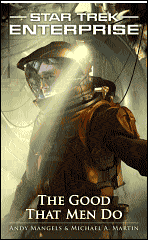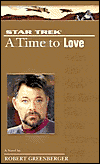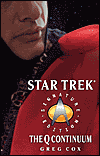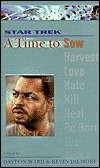
Enterprise: The Good that Men Do, by Michael A. Martin
Book Review by David Roy
Have you read this book?
The success of "Last Full Measure" prompted the editors at Pocket Books to give Andy Mangels and Michael A. Martin the reins to the new series of Star Trek: Enterprise books taking place after the end of the television series. The first book in the series, The Good That Men Do, carries forward from a revelation in the first book: namely, that Charles "Trip" Tucker didn't die as shown in the final episode of the television series. Mangels and Martin do a wonderful job of continuing the story, giving us a good reason why that episode was "wrong" and also giving us a strong story to boot. This is an excellent novel.
The story takes off directly from the episode "Terra Prime", where an anti-alien Earth group created a child from the DNA of Tucker and the Enterprise's Vulcan first officer, T'Pol. Saddened by the death of that child, and not knowing what the future holds for the inter-species couple, Trip ends up not having time to dwell on it. The Romulans are an ever-increasing threat to the so-called "Coalition of Planets" that Captain Jonathan Archer has helped create, and a secret organization called Section 31 wants to try and stop them. They are creating a fleet of super-fast warships that would overpower anything the Coalition has to offer, and Tucker's experience with Romulan technology and his engineering expertise make him the prime candidate. To go undercover, though, he'll have to die as far as his friends are concerned. Meanwhile, the Enterprise, ordered back to Earth for the signing ceremonies, is on the trail of an Orion ship that kidnapped a group of telepathic Aenar (offshoots of the Andorians) that they believe are destined for the Romulans to pilot their telepathically controlled drone ships. Will a preemptive Romulan attack shatter the Coalition before it can begin?
Mangels and Martin use an effective way of telling this story, having Jake Sisko and Nog, in the 25th century when Jake is quite old, poring over recently declassified files that purport to show the real events of this time period instead of the holographic story that Will Riker used in the series finale television episode. They highlight all the differences between "known fact" and these recent revelations, demonstrating the stupidity of many scenes in the episode involved (though both authors graciously thank Rick Berman and Brannon Braga for the episode to begin with, making me laugh out loud when I read it).
We also get a story that alternates between Trip's mission to Romulan space and Archer's mission to rescue the Aenar. Both sides of the story are effectively told, with great action and characterization as well. Mangels and Martin demonstrated in Last Full Measure that they have a handle on the Enterprise characters that most of the television writers didn't (until the final season, which was actually decent), and they showcase that ability here, bringing a tear to my eye occasionally during some of the emotional scenes. They capture T'Pol perfectly, a Vulcan who's had trouble with emotional control in the past who has to deal with Trip's "death" as well as the death of her mother and child, all in the span of a few weeks.
One bit of characterization that was a little jarring, but it always is in their Enterprise books, is Archer. It's not the fault of the authors, as Mangels and Martin give us a dynamic captain who makes decisions, disobeys orders when he knows how wrong-headed they are, and is willing to do what it takes to get the job done. The problem is that the television character was written so badly (despite Scott Bakula's strident attempts to demonstrate otherwise) that I had trouble "seeing" this character as Archer. I much prefer Mangels and Martin's version, but it did make me stop and notice a couple of times.
Another aspect that's not really the authors' fault but still made me wince was Trip's "death." Everybody knows how stupid his method of dying in the episode was, and that's what they had to work with. But I have trouble with no characters actively questioning how Trip could have done something that dumb without anybody thinking to question what happened. T'Pol questions Trip's death, but for many different reasons than that one. I would have at least expected some recriminations for Malcolm's security being so delayed in getting to the intruders that Trip had to pull off his stunt. Yes, Malcolm's in on the deception and there's a reason for security being off somewhere else, but nobody even mentioned it? I guess we have to assume it happened off "camera."
Still, when that's the only thing I have to complain about in a book (and it is a minor thing), you know the book is a good one. Mangels and Martin give us a rousing story of spying, action, emotional trauma, and good character interaction, all without missing a beat. There are some dangling threads left that, if not taken up, I will gripe over. But there's another book coming, and then a three-book series dealing with the Earth-Romulan war, so there's plenty of time to take them up. I'm sure they're only in this book for set up.
If you're a Trek fan, especially an Enterprise fan who was horribly disappointed by the series finale, you owe it to yourself to pick this one up. Even if you're not necessarily a fan of Enterprise, there's lots of future history in here that you will probably find interesting, and the authors have generally avoided any of the pitfalls that the television series had. They have a handle on the characters, and while some of them are underused (Hoshi and Mayweather, mostly), I'm sure they'll get storylines in the newer books. Give this one a try, and you'll probably be back for more in a year or two.
The story takes off directly from the episode "Terra Prime", where an anti-alien Earth group created a child from the DNA of Tucker and the Enterprise's Vulcan first officer, T'Pol. Saddened by the death of that child, and not knowing what the future holds for the inter-species couple, Trip ends up not having time to dwell on it. The Romulans are an ever-increasing threat to the so-called "Coalition of Planets" that Captain Jonathan Archer has helped create, and a secret organization called Section 31 wants to try and stop them. They are creating a fleet of super-fast warships that would overpower anything the Coalition has to offer, and Tucker's experience with Romulan technology and his engineering expertise make him the prime candidate. To go undercover, though, he'll have to die as far as his friends are concerned. Meanwhile, the Enterprise, ordered back to Earth for the signing ceremonies, is on the trail of an Orion ship that kidnapped a group of telepathic Aenar (offshoots of the Andorians) that they believe are destined for the Romulans to pilot their telepathically controlled drone ships. Will a preemptive Romulan attack shatter the Coalition before it can begin?
Mangels and Martin use an effective way of telling this story, having Jake Sisko and Nog, in the 25th century when Jake is quite old, poring over recently declassified files that purport to show the real events of this time period instead of the holographic story that Will Riker used in the series finale television episode. They highlight all the differences between "known fact" and these recent revelations, demonstrating the stupidity of many scenes in the episode involved (though both authors graciously thank Rick Berman and Brannon Braga for the episode to begin with, making me laugh out loud when I read it).
We also get a story that alternates between Trip's mission to Romulan space and Archer's mission to rescue the Aenar. Both sides of the story are effectively told, with great action and characterization as well. Mangels and Martin demonstrated in Last Full Measure that they have a handle on the Enterprise characters that most of the television writers didn't (until the final season, which was actually decent), and they showcase that ability here, bringing a tear to my eye occasionally during some of the emotional scenes. They capture T'Pol perfectly, a Vulcan who's had trouble with emotional control in the past who has to deal with Trip's "death" as well as the death of her mother and child, all in the span of a few weeks.
One bit of characterization that was a little jarring, but it always is in their Enterprise books, is Archer. It's not the fault of the authors, as Mangels and Martin give us a dynamic captain who makes decisions, disobeys orders when he knows how wrong-headed they are, and is willing to do what it takes to get the job done. The problem is that the television character was written so badly (despite Scott Bakula's strident attempts to demonstrate otherwise) that I had trouble "seeing" this character as Archer. I much prefer Mangels and Martin's version, but it did make me stop and notice a couple of times.
Another aspect that's not really the authors' fault but still made me wince was Trip's "death." Everybody knows how stupid his method of dying in the episode was, and that's what they had to work with. But I have trouble with no characters actively questioning how Trip could have done something that dumb without anybody thinking to question what happened. T'Pol questions Trip's death, but for many different reasons than that one. I would have at least expected some recriminations for Malcolm's security being so delayed in getting to the intruders that Trip had to pull off his stunt. Yes, Malcolm's in on the deception and there's a reason for security being off somewhere else, but nobody even mentioned it? I guess we have to assume it happened off "camera."
Still, when that's the only thing I have to complain about in a book (and it is a minor thing), you know the book is a good one. Mangels and Martin give us a rousing story of spying, action, emotional trauma, and good character interaction, all without missing a beat. There are some dangling threads left that, if not taken up, I will gripe over. But there's another book coming, and then a three-book series dealing with the Earth-Romulan war, so there's plenty of time to take them up. I'm sure they're only in this book for set up.
If you're a Trek fan, especially an Enterprise fan who was horribly disappointed by the series finale, you owe it to yourself to pick this one up. Even if you're not necessarily a fan of Enterprise, there's lots of future history in here that you will probably find interesting, and the authors have generally avoided any of the pitfalls that the television series had. They have a handle on the characters, and while some of them are underused (Hoshi and Mayweather, mostly), I'm sure they'll get storylines in the newer books. Give this one a try, and you'll probably be back for more in a year or two.
|
Click here to buy Enterprise: The Good that Men Do, by Michael A. Martin on Amazon
|
Enterprise: The Good that Men Do, by Michael A. Martin on Amazon

| More Books You Might Like |
Comment on Enterprise: The Good that Men Do, by Michael A. Martin
| Comments on Enterprise: The Good that Men Do, by Michael A. Martin |
| There are no comments on this book. |



